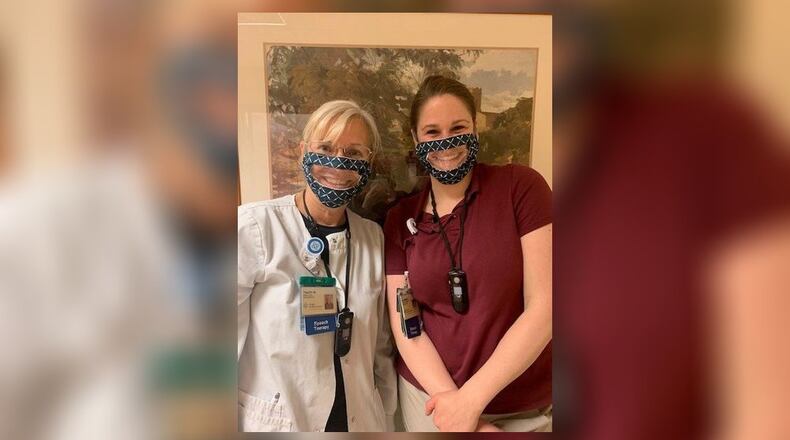Some argue donning a mask is an essential public safety act whiles others contend the coverings are unnecessary or infringe on their liberties.
Ohio Gov. Mike DeWine said in a recent interview that the protective facial coverings for the general public, against which some in the state have protested, should not become political issue.
“This is not about whether you are liberal or conservative, left or right, Republican or Democrat,” DeWine said on NBC’s “Meet the Press” on Sunday. “It’s been very clear what the studies have shown, you wear the mask not to protect yourself so much as to protect others.”
Many in Butler and Warren counties are stepping forward to make sure those that want masks have them.
When Diana Unger went shopping, she realized wearing a protective mask eliminated the “whole communication process” because she couldn’t see a person’s expression.
That got her thinking about therapists who work with people with hearing disabilities and how the masks may hamper how they communicate with their clients.
“Seeing lips move is vital,” she said.
So she designed a mask with a clear plastic insert over the mouth. She has produced about 40 of the special masks and donated them to speech therapists at Atrium Medical Center in Middletown, Kings Local School District in Warren County and Partners For Community Living, an adult developmental disabilities group home in Beavercreek.
She said each clear mask takes about 30-45 minutes to cut, prep and assemble. She gives out masks in pairs so the recipient will have a back-up during the cleaning process. Unger, 52, of Beavercreek, said condensation builds up on the plastic masks after wearing them for two hours. She includes instructions on how to clean the masks.
Besides the clear masks, Unger has made more than 700 regular masks with a goal of 1,000.
“It’s a large part of my free time,” said Unger, who added she can make 70 to 100 masks per week.
Unger has used social media to meet others who are making masks and those who need them. They share their patterns and creative ideas, she said. “Positive networking” is how she describes the social interaction.
“I’ve met wonderful people through this,” she said. “That’s the silver lining though all this.”
As the public debate about masks continues, some students attending local colleges are getting involved to help those with special needs.
Though Miami University ended in-person classes in March and switched to remote learning, some students turned their schoolwork into a project to help the hearing impaired by creating special masks as part of their “Introduction to Disability Studies” class.
Miami junior Carly Dunseath, made cloth masks that have plastic dividers revealing the wear’s mouth.
“The plastic sheet allows individuals who are hard of hearing or deaf to be included in communication wherever they go,” Dunseath said. “Regular masks ignore the needs of people with disabilities.”
She is donating her masks to local retirement homes and other health care facilities.
Miami classmate Maggie Rush also made masks with a plastic piece, but in addition, made ones that can be hooked on a headband instead of over a person’s ears. This style is more accessible for someone who uses a hearing device.
She has donated masks to The Jewish Hospital in northern Hamilton County, where her mom is a nurse, and plans to also donate some to a nursing home where her grandma is a resident.
Rush told Miami officials she was inspired by her mom to choose accessible masks for her project when her mother mentioned that it was difficult for her coworker, another nurse, to wear regular masks with her cochlear implant.
Rush said “my goal with it is to ensure everyone gets equal protection comfortably.”

